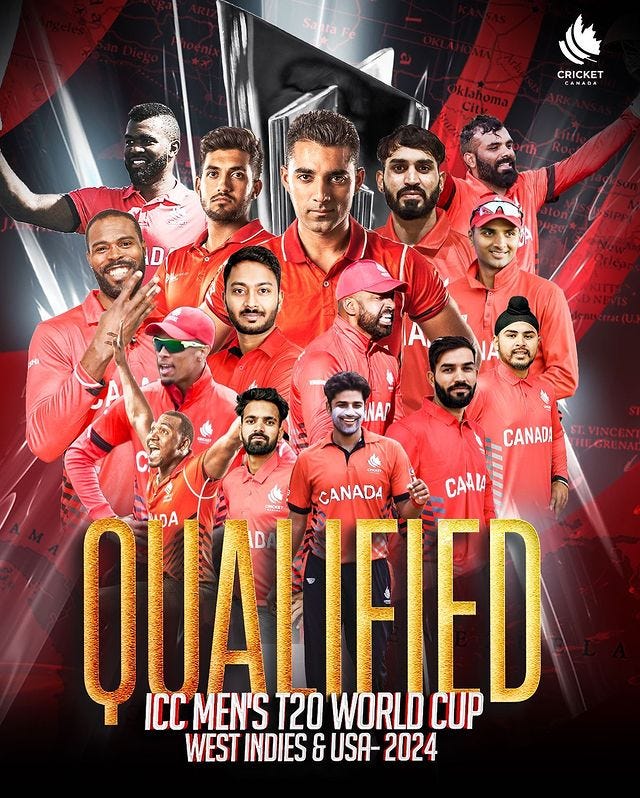Destiny, pride and progress
Canada's rise to the World Cup and cricket's place in North America with Harsh Thaker
“It was destiny that God cleared that day, and we played and won.”
Canada’s vice-captain, Harsh Thaker can’t help but smile when reflecting on all that came together last October for his side to qualify for the Men’s T20 World Cup for the first time in their history.
One game behind on the standings, Canada needed to beat the hosts Bermuda in their final match at the Americas qualifier.
On that last morning, a tropical storm rolled in, which washed out the morning fixture and – ostensibly – Canada's hopes. Slowly, though, the rain cleared, and by the afternoon there was even sunlight, allowing for a thumping Canadian victory.
“It is really special to have been able to qualify like that.”
Eight months later, and whether it is destiny again or simply one of cricket's notoriously cruel twists, Harsh won’t be there when Canada open proceedings against the United States this weekend.
The all-rounder broke his foot completing shuttle runs at training and was ruled out of the World Cup last week.
Devastating for one of the rising stars of the game in the region, Harsh can be pragmatic when considering what qualification means for Canadian cricket.
He simply describes it as the “cherry on top” of a bumper twelve months for a squad that is reinvigorating cricket in a country that has not competed at a World Cup since 2011.
“For us, it started when we got our ODI ranking status back last year. That was crucial and one of the biggest things to happen in Canadian cricket,” he reflects. “In all honesty, it could be the best thing we have achieved in the last thirteen years.”
In regaining that status, Canada receives increased funding from the ICC, and the players now earn central contracts from the Board. Put simply, they are now full-time professional cricketers.
Considering the ODI status works in a four-year cycle, too, their future is somewhat secured and the path forward more attainable.
“For the future of cricket in Canada, it was just huge,” Harsh smiles.
As the national team continues to establish a presence on the world stage, interest and engagement are slowly building at home.
In the last six months alone, several corporate sponsors, including major banks and most recently Nissan Canada, have come on board to support the team’s rise.
Additionally, Cricket Canada has partnered with investment group WEIC Sports United, to form Boundaries North. A long-term strategic alliance, it hopes to help create a “healthy and economically prosperous sporting ecosystem for cricket across the country.”
Also committed to providing the infrastructure, facilities and opportunities for increased participation, they are working to support a forecast increase of more than 500,000 additional Canadians playing the game by 2033.
A large part of that increased participation will likely come from Canada’s migrant population.
Something that Harsh is cognisant of, he alludes to the fact that he is one of only a couple in the current squad who grew up playing their grassroots cricket in Canada.
“At the moment we rely heavily on players who have grown up and played elsewhere,” he explains. “Whether that is India, the Caribbean, or England. It can certainly help, but it is important to keep developing your own grass-roots players.
“Because you never know if that flow of talent will stop, and you don’t want to rely on something outside of your control.”
To that end, Harsh reckons that the burgeoning GT20 League can play a vital role in inspiring a latent love of the game in Canada.
The competition, which started in 2018, has already welcomed the likes of Steve Smith, David Warner, Mohammed Rizwan and Rassie van der Dussen, giving the locals a sense of what the pinnacle of cricket can look like.
“It has been huge for us,” Harsh says. “Both as players and cricket lovers to get that experience and exposure is unbelievable.
“It is still not quite what it could be though,” he says. “There are a lot of fans here, particularly from South-Asian backgrounds who follow their own teams. I hope that GT20 can inspire more people to follow Canada.”
It is heartening to hear Harsh speak with such passion about growing cricket in Canada.
Indeed, his reflections on the game are not about runs, or wickets. Instead, he sees his role as an international cricketer to be one of more wide-reaching importance.
“One of my dreams is to do something that young people can look up to,” he explains. “For them to recognise that playing cricket for Canada and doing well really means something.
“I have wanted to believe for a long time that inspiring youngsters here is possible through cricket. If I can do that, it would be a real honour for me.”
So, even though he won’t be taking the field at their watershed moment next month, Harsh is optimistic that competing at a World Cup – one where they will play against India and Pakistan – will help to further Canada’s cause.
"We want people to see us playing and to think that this is a capable team, ready to do more.
“We want to start getting recognised around the world, get the message out that we are a good team and at least become the best team in Associate cricket.”
Be it next month, or further down the line, perhaps all this and more will also be part of Canadian cricket’s destiny.







